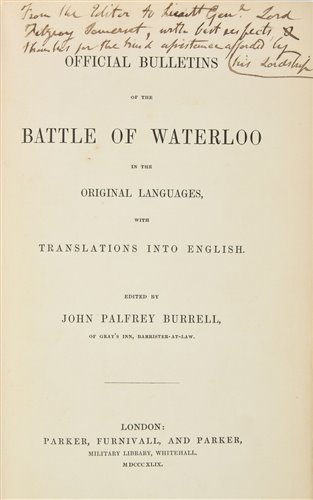WITHERING, William (1741-1799). An Account of the Foxglove, and some of its medical uses; with practical remarks on dropsy, and other diseases. Birmingham: M. Swinney for G.G.J. and J. Robinson, 1785.
First edition of Withering's landmark treatise on the medical uses of Digitalis purpurea, uncut in original boards with hand-colored plate and complete with the rare first blank leaf. Foxglove (Digitalis purpurea) had been used widely in popular medicine, but in the late 18th century Withering conducted a series of clinical trials over a period of ten years to define its correct dosage and effective use in dropsy and heart disease, carefully stating that it was ineffective for certain other conditions. Its active compound, digoxin, was to become the most valuable cardiac drug ever discovered, and its introduction is one of the landmarks in the history of cardiac disease.
The origin of Withering's interest was a "receipt" for a cure for dropsy. He writes in the introduction that "I was told it had long been kept a secret by an old woman in Shropshire, who had sometimes made cures after the more regular practitioners had failed. I was informed also that the effects produced were violent vomiting and purging; for the diuretic effects seemed to have been overlooked. This medicine was composed of twenty or more different herbs; but it was not difficult for one conversant in these subjects to perceive that the active herb could be no other than the Foxglove." Withering was also a prominent member of the Lunar Society, a dinner club which brought together many important characters of the Midlands Enlightenment, including Erasmus Darwin and Josiah Wedgewood, and Joseph Priestley. Grolier Medicine 49; Heirs of Hippocrates 1039; Hunt 676; Norman 2255; Le Fanu, Notable Medical Books, p. 139; Willius and Keys, Cardiac Classics pp. 225-252; Major Classic Descriptons of Disease pp. 437-443.
Octavo (225 x 135mm). Half title, 1p. ad at end, with the rare first blank leaf signed a. Large hand-colored folding plate, state with the large leaf on the left and signed by Sowerby (plate reinforced on verso folds; very light toning throughout). Original paper boards, uncut, printed paper label on spine. Cloth box. Provenance: Thomas Brotherton (contemporary signature on a1) – Dr R. Q. Le Baron (signature dated 6 August 1902 at London).
WITHERING, William (1741-1799). An Account of the Foxglove, and some of its medical uses; with practical remarks on dropsy, and other diseases. Birmingham: M. Swinney for G.G.J. and J. Robinson, 1785.
First edition of Withering's landmark treatise on the medical uses of Digitalis purpurea, uncut in original boards with hand-colored plate and complete with the rare first blank leaf. Foxglove (Digitalis purpurea) had been used widely in popular medicine, but in the late 18th century Withering conducted a series of clinical trials over a period of ten years to define its correct dosage and effective use in dropsy and heart disease, carefully stating that it was ineffective for certain other conditions. Its active compound, digoxin, was to become the most valuable cardiac drug ever discovered, and its introduction is one of the landmarks in the history of cardiac disease.
The origin of Withering's interest was a "receipt" for a cure for dropsy. He writes in the introduction that "I was told it had long been kept a secret by an old woman in Shropshire, who had sometimes made cures after the more regular practitioners had failed. I was informed also that the effects produced were violent vomiting and purging; for the diuretic effects seemed to have been overlooked. This medicine was composed of twenty or more different herbs; but it was not difficult for one conversant in these subjects to perceive that the active herb could be no other than the Foxglove." Withering was also a prominent member of the Lunar Society, a dinner club which brought together many important characters of the Midlands Enlightenment, including Erasmus Darwin and Josiah Wedgewood, and Joseph Priestley. Grolier Medicine 49; Heirs of Hippocrates 1039; Hunt 676; Norman 2255; Le Fanu, Notable Medical Books, p. 139; Willius and Keys, Cardiac Classics pp. 225-252; Major Classic Descriptons of Disease pp. 437-443.
Octavo (225 x 135mm). Half title, 1p. ad at end, with the rare first blank leaf signed a. Large hand-colored folding plate, state with the large leaf on the left and signed by Sowerby (plate reinforced on verso folds; very light toning throughout). Original paper boards, uncut, printed paper label on spine. Cloth box. Provenance: Thomas Brotherton (contemporary signature on a1) – Dr R. Q. Le Baron (signature dated 6 August 1902 at London).




.jpg)










Try LotSearch and its premium features for 7 days - without any costs!
Be notified automatically about new items in upcoming auctions.
Create an alert